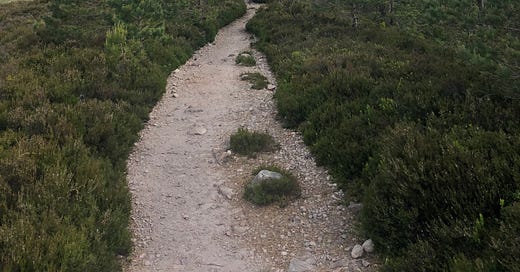Didn’t catch part one last week? Read it here.
False Starts | Part 2
Everything that you carry with you on a long-distance hike is essential. Every item becomes part of your body, part of your weight, whatever you have to carry is slung to you and is important. It makes you aware with every step of its presence and equally, it makes you aware of everything that is lacking.
– That isn’t there.
–
Thriving not surviving. I keep repeating in my head as I’m packing for my 3-day solo hike. As I make decisions on whether to take a pillow with me (yes) or to buy a camping stove so I could have warm food and tea in the morning (also yes). Thriving not surviving. I think as I’m standing in the Decathlon picking out hiking sticks, a face covering for midges, and thin silk gloves for my delicate hands. And a new pair of hiking socks for my equally delicate feet. – I feel like the Princess and the Pea: I am delicate! I want to shout walking through the aisles. My hiking sticks raised in each fist.
I can be robust, I can make do with scarcity; I have slept under a table tennis table on a playground once in early May. I can suffer through cold, hunger, tiredness. I can lie on a field crying; I can walk 40 kilometers, over a hill with one shoe on. I can be strong when I have to, but I want to be delicate when I can.
–
The flame is piercing blue and white circling around the metal top. It is the first time I ever use a camping gas stove myself, the first time I screw on the gas canister, turn on the gas, listen for the sound rushing through the metal and click the ignition to start the flame: I shriek out of joy.
And then I laugh a bit at myself for how empowered I feel by performing this fairly simple task. I made fire! Even though I cook with gas all the time at home and feel nothing. Except sometimes an uncanny voice whispering I did turn it off right? when I’m out.
But somehow this camping stove possessed an invisible line, a block I didn’t consciously know that I had and crossing it only made me aware of it. I apparently thought I was incapable. I apparently believed that I need and yes here comes gendered stereotypical upbringing: a man to do it for me. Gasp.
It is a very unsettling feeling to realise how deep seated those beliefs are, how I still occasionally find myself looking up for help. And I’m reminded of an episode of Girls, where Hannah the main character describes the following memory to her neighbour "You know when you're young and you drop a glass and your dad says like 'Get out of the way' so you can be safe while he cleans it up? Well, now nobody really cares if I clean it up myself. Nobody really cares if I get cut with glass. If I break something, no one says 'Let me take care of that.' You know?"
Looking at the glowing metal ring sitting on my dressing table, waiting for it to cool down so I can pack it in my backpack for the next morning, I realise I know how to pick up my own glass now. And I’ve been doing so for a while now. Thriving not surviving, is the new tune stuck in my head.
–
I arrive in Aviemore on a particular sunny day just after 1 PM with still enough time to get some kilometers under my feet and also decide which path I actually want to take. I had researched a couple of routes and read a few blogs on recommended weekend trips but couldn’t make myself decide beforehand. I want to see for myself how much I can walk in a day, if I would have the courage to hike up the mountains, the infrastructure of the paths, the weather conditions. The Cairngorms are the largest national park in the UK, bigger than the whole of Luxembourg and containing four of the five highest mountains in Scotland. The highest being Ben Macdui with just over 1300 meters; there is snow on some of the peaks all year around.
After walking 8 hours on the Lairig Ghru hill-pass and on a height of 800 meters, I realise I have no phone reception any longer. Something that I had been warned of: signal can be spotty.




